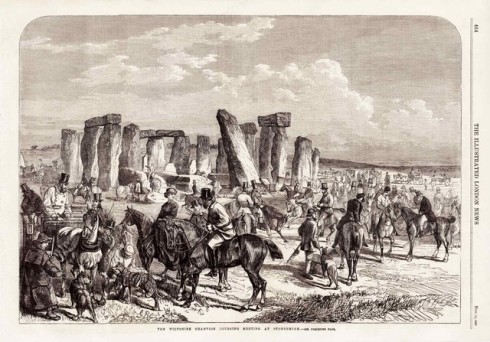
Coursing at Stonehenge in 1865. The Illustrated London News
In a recent BBC regional news report, Stonehenge manager Kate Davies is reported as saying an alcohol ban at Stonehenge would, “…help everyone to have a better experience of solstice.” In what way, Ms Davies, would such a ban help people have a better experience? Are you saying that by presently allowing a moderate degree of drinking at solstice time that is somehow adversely affecting people’s enjoyment of the overall solstice event there? If so, do you have details and the statistics to support such a claim? No-one, of course, wants to see drunkenness and rowdiness at Stonehenge but aren’t you perhaps taking a sledgehammer to crack a nut here? Perhaps this is an opportune time to remind you that, just over thirty years ago, a hard-won battle was fought to allow –
The Peace Convoy, a convoy of several hundred New Age travellers, from setting up the 1985 Stonehenge Free Festival in Wiltshire, England. The police were enforcing a High Court injunction obtained by the authorities prohibiting the 1985 festival from taking place. Around 1300 police officers took part in the operation against approximately 600 travellers.
Dozens of travellers were injured, 8 police officers and 16 travellers were hospitalised. 537 travellers were eventually arrested. This represents one of the largest mass arrest of civilians since at least the Second World War, possibly one of the biggest in English legal history.
Two years after the event, a Wiltshire police sergeant was found guilty of Actual Bodily Harm as a consequence of injuries incurred by a member of the convoy during the Battle of the Beanfield. Source: the Wikipedia entry on The Battle of the Beanfield.
In the same BBC report, Senior Druid King Arthur Pendragon is reported as saying English Heritage was, “…looking for confrontation [and that he will fight] “…the total ban on alcohol. It’s a celebration – not to be sanitized. It does not matter how they dress it up, we will not Pay to Pray.”
Well, is there a possible middleway here? The problem really comes down to a minority who spoil the event for everyone else. Would it not be more sensible, therefore, to control the amount of alcohol taken on site (as is now the case) and to restrict access to the actual stones; meanwhile allowing people the freedom to enjoy the festive atmosphere of the event from the perimeter?
If King Arthur were to bend just a little, and if English Heritage were to think a little more laterally, could we possibly achieve the best of both worlds? Last year 23,000 people attended the summer solstice celebrations at Stonehenge. If each were to pay just £1 that would achieve £23,000 and would probably cover the cost of providing portaloos, litter pickups etc. Actually, why not go a little further and give people rubbish bags as they arrive on site with, Stonehenge is a World Heritage Site and sacred to many. Please take your litter home with you, printed on them. Why not try to persuade people to be considerate rather than employing what might be seen as profit-motivated, strong-arm tactics against them. Stonehenge has, after all, been a gathering place of one sort or another from the beginning. Let’s not relegate that fact to the rubbish bin through lack of compromise and creative thinking.
Heritage, after all, is not just about stones, architecture and artefacts; it’s also about real-time cultural awareness and real-time human interaction.

An open-air concert at Stonehenge. Published by the Sketch 1896

2 comments
Comments feed for this article
06/02/2016 at 7:13 pm
StonehengeNews
Reblogged this on Stonehenge News and Information.
LikeLike
07/02/2016 at 8:31 am
roygoutte
I’m wondering just how many of that reported 23,000 at the Summer Solstice were there because it was socially the ‘place to be’ and not because they were devoted stone-heads or true believers/worshippers. This socialising could explain the amount of alcohol consumed leading to the occasional damage and stones climbed. In my experienced it never enters the head of said true believers or stone-heads to even consider climbing the stones or causing trouble.
LikeLike